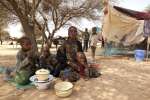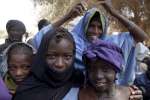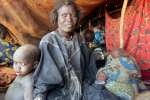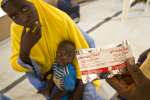- Text size
 |
|  |
|  |
| 
- Français
Niger's Diffa district provides shelter for Nigerians fleeing violence
News Stories, 24 January 2014
BOSSO, Niger, January 24 (UNHCR) – Surrounded by her earthly possessions in a makeshift shelter, Mariama blows out her cheeks and makes the sound of an explosion as she tells visitors why she fled from her home in north-eastern Nigeria.
The attack that made her flee Baga village took place nine months ago, but she recalls the traumatic experience as though it were yesterday. And new arrivals continue to refresh her memory: an estimated 1,500 have fled into southern Niger's Diffa region in recent days to escape fresh violence in Nigeria. A further 4,000 Nigerians have fled to Cameroon
In her case, Mariama claims, "Men from Boko Haram [a militant group] had come to attack a military base. Our village is nearby so the military then came to attack us" in the early morning. "It was around 6pm when we heard gunshots. The gunfire struck our house and exploded like a bomb," the 47-year-old tells UNHCR visitors to the border town of Bosso in Diffa region, a granddaughter sprawled on her lap.
She says the explosions were grenades, hurled indiscriminately at her home, sparking a fire that levelled the entire village. "We fled without shoes, without anything, carrying our children as we could."
The security situation in parts of north-eastern Nigeria has been deteriorating since May 2013, when the government declared a state of emergency in three states – Adamawa, Borno and Yobe – and launched a military operation to put down the insurgency. Recurrent attacks by rebel groups on civilians and security personnel have increased since 2012.
A recent report by the UN Office for the Coordination of Humanitarian Affairs (OCHA), said that more than 1,200 people, including civilians, military and insurgents, have been killed. As a result of the attacks, many Nigerians have reported a pattern of preemptive flight: once insurgents attack, civilians flee immediately in fear of a possible army reprisal.
As her village burned, Mariama fled to the bush with her husband and their 10 children, drinking water from puddles. After three days, she says, the army returned, triggering panic and fear among those in hiding. People fled in all directions; Mariama and her family made their way on foot to Bosso.
Mariama's friend Sahadatou, who calls in for a chat, was also in Baga on the day of the attack. Sitting among the clothes, blankets and buckets, she says she came out of hiding to help her injured neighbours. "So many died in the fire, but the bodies were burned so badly, we couldn't identify them," she says, adding: "We don't even know how many died." She too fled to Niger.
A Niger government census released in November revealed that more than 37,000 people-including 8,000 Nigerians and nearly 30,000 Niger nationals-had fled into the Diffa region since last May. A small number of third-country nationals have also sought refuge in the area. In December, the government started granting temporary refugee status to Nigerians fleeing to Niger from the three affected states.
Since the start of the influx, local communities have welcomed displaced people into their villages and homes, making land or rooms available. The mayor of Bosso, Aboubacar Marah, set the example by hosting nearly 100 people, mostly women and children. "I've never seen anything like it," he says of the influx. "The border is only 100 meters from here and we hear shooting at night from the other side."
To respond to the influx, UNHCR deployed an emergency protection team in May.
"Our team had to adapt quickly to the hidden nature of the crisis," says Yvette Muhimpundu, a senior protection officer. "We are incredibly grateful that the community welcomed the displaced into their homes so we are focusing on strengthening the resilience of both the refugees and the host community."
She says the goal of this community approach is to foster peaceful coexistence. By ensuring that the shelter, food, security and health needs of the refugees and the locals are met, both communities will benefit equally from UNHCR's support.
In partnership with other humanitarian agencies, UNHCR has distributed relief items and will launch a shelter programme to better accommodate displaced people. In addition, the government of Niger will issue identity cards to the displaced this year, while the World Food Programme will distribute food to the most vulnerable families among those who fled Nigeria.
As for Mariama and her family, the warm reception and help that they have received here has helped to make their situation more bearable. But more than anything, she's thankful she found peace. "Even if I'm not in a real house, I can sleep in peace and security. There is no question of going back now, it's too insecure."
She and her family are doing their best to provide for themselves; she sells pancakes in the market, her daughter works as a seamstress and her husband is cultivating a plot of fertile land near Lake Chad. Despite her new life as a refugee, Mariama's physical and mental state has dramatically improved.
"If you had seen me when I arrived, you would have pitied me," she tells UNHCR. "But now I'm recovered and I'm strong. No pity now."
By Kathryn Mahoney in Bosso, Niger


















































